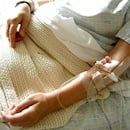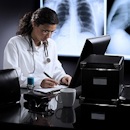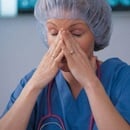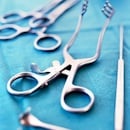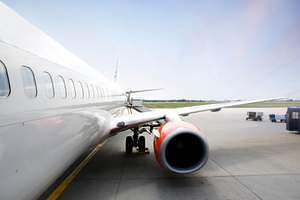
Airport Emergency: A Nurse's Story
Imagine yourself walking through your neighborhood mall, grocery store, or the airport -- when you unexpectedly see a person lying on the ground. What do you do? Do you hesitate, or do you instinctively respond knowing you’ve done this a thousand times before in a hospital setting?
The statistics from the American Heart Association state that 70% of Americans feel helpless to act during a cardiac emergency because they either do not know how to administer CPR or their training has significantly lapsed. As a nurse, it is part of our job description to keep our basic life support skills updated. Perhaps just as important, (but largely ignored), is that laypersons should be encouraged to know the basics of CPR since there are nearly 383,000 out-of-hospital cardiac arrests that occur annually; a staggering 88% of cardiac arrests occur at home.
In April 2014, I was walking through the airport when I saw a man on the ground. Quickly assessing the situation, I noticed there were people responding and overheard that 911 was called. As an ICU nurse of 15 years, I peeked around the attending police officers to see if I could help. The man was gasping for breath, though they were agonal breaths and he was unresponsive. I told the police officer that I was a nurse and asked if they needed any help. After five seconds of a pulse check, I asked the police officer to bring me the AED, confirmed that he did not have a pulse, and began CPR. The police officer and I performed early defibrillation and continued CPR until the paramedics arrived.
Of the countless times I have performed my BLS skills in the hospital, it was a very different feeling having to perform the same skills without nursing scrubs, skilled professionals, or emergency equipment on hand. But, the best feeling of all was saving that life when it wasn’t expected of me. As a BLS and ACLS instructor, this story of the importance of simply responding is now part of my didactic talk in the course.
Don’t be afraid to act! Call 911. Check for a pulse. Call for an AED if in a public place. Perform CPR. And give early defibrillation when indicated. But most importantly, respond!
Standing alongside members of the Massachusetts State Police Department, I was recently given an award for Outstanding Achievement from Massport Authority at Boston Logan Airport. It felt weird to receive an award for something that I am trained to do. At the same time, it makes me admire and celebrate the courage it takes for people who are not professionally trained (like nurses), who respond to similar situations in their homes and other places. The lesson here? If you happen to be walking through a mall, grocery store, or airport, and you see a person on the ground. . . just respond. A life may depend on you.
Biography:
Shelley Lynch has been publishing with RN.com since 2003 and has more than 14 years of critical care nursing experience. She has worked in a variety of intensive care units in some of the nation’s top hospitals and is a nursing consultant to law firms and medical device companies. Shelley is also an AHA instructor and teaches, both ACLS and BLS classes in the Boston area. In addition, she is a bedside ICU nurse in Boston.
